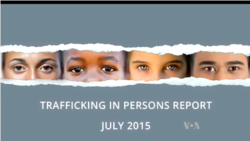Efforts to combat human trafficking around the world have advanced steadily over the past 15 years.The Trafficking in Persons, or TIP Report, issued by the United States Department of State, has covered global trends to fight human trafficking since 2000. The 2015 TIP Report evaluates the efforts of 188 countries and territories, including the United States, to fight modern slavery.Governments of many countries investigate and prosecute trafficking cases, provide protection to victims, and find new ways to prevent the crime from happening in the first place. Slowly and steadily, working together across borders and continents, the global community has been pushing back against the crime of modern slavery.
Nonetheless, millions of people continue to toil in forced labor, exploited for the enrichment of others in virtually every country in the world. According to the International Labor Organization, people trafficked for labor and sexual exploitation bring in enormous profits, as much as 150 billion dollars’ worth each year. And in 2012, the ILO estimated that there were 14.2 million victims of forced labor, primarily in agriculture, construction, domestic work, manufacturing, mining and utilities.
Too often, goods and services produced by forced labor are woven into the long and complex supply chains that cross multiple borders. Large companies may rely on subcontractors who use slave labor, and because there is little or no oversight, it is difficult to determine whether their products have been produced by persons held in compelled service.
This means that the raw materials used to produce your phone may have been mined by victims of forced labor. Slave labor may have been used to manufacture the components of that office computer. Or the men who caught, cleaned or packaged the shrimp that made for such a tasty dinner, were not paid for their labor.
The private sector, civil society, and individual consumers can all help to eliminate the use of slave labor in global supply chains.Business leaders can establish and implement anti-trafficking policies to prevent and address any trafficking risks in their operations. Governments can strengthen and enforce the rule of law, examine their own procurement supply chains, and institute policies that respect workers. And everyone, including individual citizens, can affect change by only purchasing from businesses with transparent supply chains.
Modern Slavery is not a problem to be managed; it is a crime to be stopped.

















